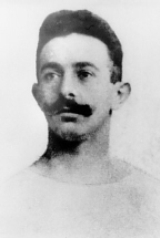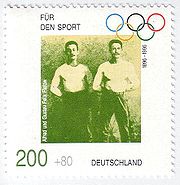
Alfred Flatow
Encyclopedia
Alfred Flatow was a German
gymnast
. He competed at the 1896 Summer Olympics
in Athens
. He was Jewish.
Flatow was a successful competitor in 1896. He won the parallel bars, was the runner-up in the horizontal bar
, and was a member of the German team that took the gold medal
s in both the parallel bars and the horizontal bar team events. He also competed in the vault, pommel horse
, and rings competitions. Flatow's cousin, Gustav Flatow
, was also a member of the German gymnastics delegation in 1896.
After his return to Germany he and most of the other German gymnasts were suspended, because the Deutsche Turnerschaft (at this time the governing body
of German gymnastics) boycotted the Olympic games with the reason that competing is "ungerman."
After the Nazi takeover in Germany in 1933 and the Holocaust, he had to flee to the Netherlands
in 1938 due to being Jewish. When Nazi Germany invaded the Netherlands he was jailed and deported to Theresienstadt concentration camp
, where he died at the age of 73. His cousin Gustav Flatow
was also a victim of the Holocaust; Alfred died in Theresienstadt Ghetto in December 28, 1942,Gustav on Jan 29, 1945.
 In 1997 Berlin
In 1997 Berlin
honoured Alfred and Gustav Flatow by renaming the Reichssportfeldstraße (a lane) near the Olympic Stadium
to Flatowallee (Flatow-avenue). There is also the Flatow-Sporthalle (sports hall) at Berlin
-Kreuzberg
with a commemorative plaque for both. The Deutsche Post
issued a set of four stamps to celebrate the 100th anniversary of the modern Olympic games. One of this stamps shows the Flatows.
Germany
Germany , officially the Federal Republic of Germany , is a federal parliamentary republic in Europe. The country consists of 16 states while the capital and largest city is Berlin. Germany covers an area of 357,021 km2 and has a largely temperate seasonal climate...
gymnast
Gymnastics
Gymnastics is a sport involving performance of exercises requiring physical strength, flexibility, agility, coordination, and balance. Internationally, all of the gymnastic sports are governed by the Fédération Internationale de Gymnastique with each country having its own national governing body...
. He competed at the 1896 Summer Olympics
1896 Summer Olympics
The 1896 Summer Olympics, officially known as the Games of the I Olympiad, was a multi-sport event celebrated in Athens, Greece, from April 6 to April 15, 1896. It was the first international Olympic Games held in the Modern era...
in Athens
Athens
Athens , is the capital and largest city of Greece. Athens dominates the Attica region and is one of the world's oldest cities, as its recorded history spans around 3,400 years. Classical Athens was a powerful city-state...
. He was Jewish.
Flatow was a successful competitor in 1896. He won the parallel bars, was the runner-up in the horizontal bar
Horizontal bar
The high bar, also known as the horizontal bar, is an apparatus used by male gymnasts in Artistic Gymnastics. It traditionally consists of a cylindrical metal bar that is rigidly held above and parallel to the floor by a system of cables and stiff vertical supports. Gymnasts typically wear leather...
, and was a member of the German team that took the gold medal
Gold medal
A gold medal is typically the medal awarded for highest achievement in a non-military field. Its name derives from the use of at least a fraction of gold in form of plating or alloying in its manufacture...
s in both the parallel bars and the horizontal bar team events. He also competed in the vault, pommel horse
Pommel horse
The pommel horse is an artistic gymnastics apparatus. Traditionally, it is used by only male gymnasts. Originally made of a metal frame with a wooden body and a leather cover, modern pommel horses have a metal body covered with foam rubber and leather, with plastic handles .- History :The pommel...
, and rings competitions. Flatow's cousin, Gustav Flatow
Gustav Flatow
Gustav Felix Flatow was a German gymnast. He competed at the 1896 Summer Olympics in Athens and at the 1900 Summer Olympics in Paris....
, was also a member of the German gymnastics delegation in 1896.
After his return to Germany he and most of the other German gymnasts were suspended, because the Deutsche Turnerschaft (at this time the governing body
Sport governing body
A sport governing body is a sports organization that has a regulatory or sanctioning function. Sport governing bodies come in various forms, and have a variety of regulatory functions. Examples of this can include disciplinary action for rule infractions and deciding on rule changes in the sport...
of German gymnastics) boycotted the Olympic games with the reason that competing is "ungerman."
After the Nazi takeover in Germany in 1933 and the Holocaust, he had to flee to the Netherlands
Netherlands
The Netherlands is a constituent country of the Kingdom of the Netherlands, located mainly in North-West Europe and with several islands in the Caribbean. Mainland Netherlands borders the North Sea to the north and west, Belgium to the south, and Germany to the east, and shares maritime borders...
in 1938 due to being Jewish. When Nazi Germany invaded the Netherlands he was jailed and deported to Theresienstadt concentration camp
Theresienstadt concentration camp
Theresienstadt concentration camp was a Nazi German ghetto during World War II. It was established by the Gestapo in the fortress and garrison city of Terezín , located in what is now the Czech Republic.-History:The fortress of Terezín was constructed between the years 1780 and 1790 by the orders...
, where he died at the age of 73. His cousin Gustav Flatow
Gustav Flatow
Gustav Felix Flatow was a German gymnast. He competed at the 1896 Summer Olympics in Athens and at the 1900 Summer Olympics in Paris....
was also a victim of the Holocaust; Alfred died in Theresienstadt Ghetto in December 28, 1942,Gustav on Jan 29, 1945.
Honours after death

Berlin
Berlin is the capital city of Germany and is one of the 16 states of Germany. With a population of 3.45 million people, Berlin is Germany's largest city. It is the second most populous city proper and the seventh most populous urban area in the European Union...
honoured Alfred and Gustav Flatow by renaming the Reichssportfeldstraße (a lane) near the Olympic Stadium
Olympic Stadium (Berlin)
The Olympiastadion is a sports stadium in Berlin, Germany. There have been two stadiums on the site: the present facility, and one that is called the Deutsches Stadion which was built for the aborted 1916 Summer Olympics. Both were designed by members of the same family, the first by Otto March...
to Flatowallee (Flatow-avenue). There is also the Flatow-Sporthalle (sports hall) at Berlin
Berlin
Berlin is the capital city of Germany and is one of the 16 states of Germany. With a population of 3.45 million people, Berlin is Germany's largest city. It is the second most populous city proper and the seventh most populous urban area in the European Union...
-Kreuzberg
Kreuzberg
Kreuzberg, a part of the combined Friedrichshain-Kreuzberg borough located south of Mitte since 2001, is one of the best-known areas of Berlin...
with a commemorative plaque for both. The Deutsche Post
Deutsche Post
Deutsche Post AG, operating under the trade name Deutsche Post DHL, is the world's largest logistics group. With its headquarters in Bonn, the corporation has 467,088 employees in more than 220 countries and territories worldwide and generated revenue of € 51.48 billion in 2010...
issued a set of four stamps to celebrate the 100th anniversary of the modern Olympic games. One of this stamps shows the Flatows.
See also
- List of select Jewish gymnasts

